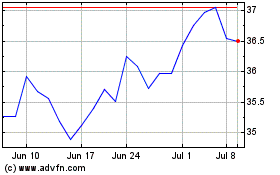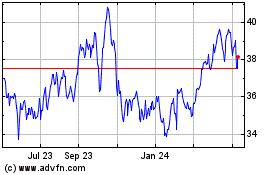BP Suffers Third Straight Quarterly Loss -- 2nd Update
July 26 2016 - 8:48AM
Dow Jones News
By Selina Williams
LONDON--BP PLC on Tuesday said a two-year oil price slump and
the 2010 Gulf of Mexico oil spill were exacting a punishing toll,
sending the company to its third straight quarterly loss.
The British oil giant said it posted a $2.25 billion net loss in
the second quarter of 2016, in the first of a series of earnings
disclosures from large Western oil companies this week. The results
were panned by analysts, and investors sent BP's shares down as
much as 3.2% on Tuesday morning.
The results demonstrated how difficult it is for BP to turn the
corner on the Deepwater Horizon explosion, which cost the company
another $5.2 billion pretax accounting charge in the second
quarter. The company said its total bill is now $61.6 billion for a
disaster that killed 11 rig workers and spilled millions of barrels
of oil into the Gulf.
The company on Tuesday pointed to new projects that will
increase its production by 800,000 barrels of oil equivalent a day
by 2020, part of its effort to emphasize a renewed focus on growth
following years of asset sales and shrunken ambitions following the
Gulf spill.
The disaster, also known as the Macondo well blowout, isn't
expected to materially affect BP's profits in the future, the
company said, with all of the litigation, government fines and
cleanup costs accounted for.
"It's a huge relief after six years," Chief Executive Bob Dudley
said in an interview.
"The company is able to plan--with much more certainty," said
Mr. Dudley, who was installed to steer the company through the
crisis and said he had no plans to step aside now that the company
was looking past the spill's fallout.
But Tuesday's disclosures revealed ominous near-term signals for
BP and other big, integrated oil companies.
BP said profit margins at its refineries were at their lowest
levels since 2010, casting a pall over what was once a bright spot
in the struggling industry. Refineries tend to make money during
periods of low oil prices, because they can buy crude cheap and
sell fuel products for higher margins.
BP's exploration and production division--normally its most
profitable unit when oil prices are higher--continued to bleed
money, losing $109 million before tax and interest in the
quarter.
Flagging oil prices loom over BP and other energy companies as
they move into the second half of the year, when many were counting
on the market to recover.
In the second quarter of 2016, Brent oil prices averaged $46 a
barrel, compared with $62 a barrel in the same period a year
earlier. Overall, prices are down about 60% from their peak in
2014, when they were more than $100 a barrel.
A rally that lifted prices from a 13-year low near $27 a barrel
in January to over $50 a barrel this spring has stalled. Prices
were falling further on Tuesday morning in London, with Brent crude
trading at $44.45 a barrel.
However, Mr. Dudley struck a more bullish tone than he had last
year, saying that he expected oil prices of between $50 to $60 a
barrel next year as the crude oil market tightens and a gasoline
glut is mopped up.
"We're not as pessimistic as some," he said.
His comments echo those from the world's two biggest oil service
companies, Schlumberger Ltd. and Halliburton Co., which last week
called the bottom of the market, indicating that the industry is
starting to look to a recovery despite recent volatility.
BP said it had made progress in cutting costs. Over the past
four quarters, the company said, its cash costs were about $5.6
billion lower than in 2014. By 2017, the company expects its cash
costs will be $7 billion lower than 2014, a year when most
companies had budgets based on prices of $100 a barrel.
BP's $2.25 billion loss--on a net replacement-cost basis,
analogous to the net income that U.S. oil companies report--was
less than its $6.27 billion loss in the second quarter of 2015,
when it also was hit by charges for Deepwater Horizon.
But analysts had expected better results. Even stripping out
one-off charges such as the Deepwater Horizon losses, the company's
underlying earnings of $720 million were around 45% lower than BP's
underlying earnings of $1.31 billion in the second quarter a year
ago. Six analysts polled by Dow Jones Newswires had predicted
underlying earnings of $839 million.
Write to Selina Williams at selina.williams@wsj.com
(END) Dow Jones Newswires
July 26, 2016 08:33 ET (12:33 GMT)
Copyright (c) 2016 Dow Jones & Company, Inc.
BP (NYSE:BP)
Historical Stock Chart
From Mar 2024 to Apr 2024

BP (NYSE:BP)
Historical Stock Chart
From Apr 2023 to Apr 2024
